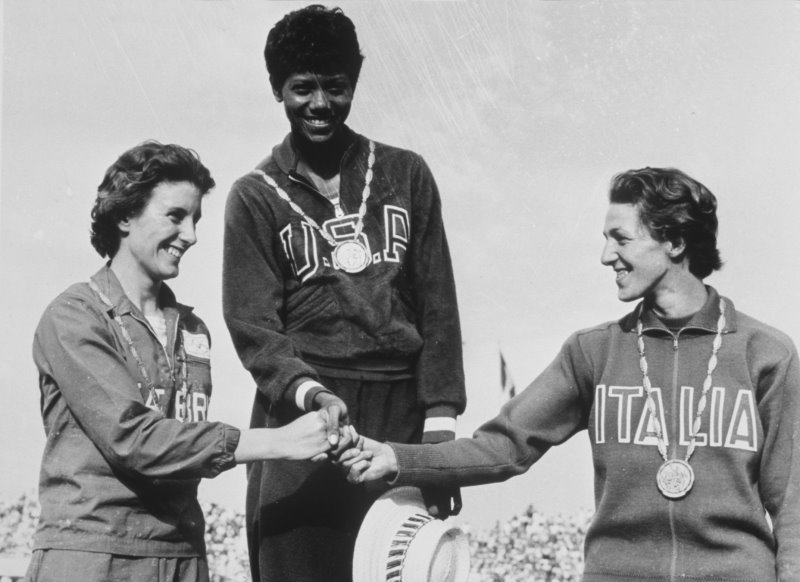
Born premature in a poor family with several health problems, Wilma Rudolf fought her way to become one of the most famous American athletes and an Olympic champion!
The 1960 Rome Olympics, Wilma Rudolph became “the fastest woman in the world”
At the 1960 Rome Olympics, Rudolph became “the fastest woman in the world” and the first American woman to win three gold medals in one Olympics. She won the 100- and 200-meter races and anchored the U.S. team to victory in the 4 x 100-meter relay, breaking records along the way.
Rudolph’s Olympic performances (she also won a bronze medal at age 16 in the relay at Melbourne in 1956) were spectacular. But it is the story of how she got there that makes her accomplishments legendary.
Wilma Rudolph – Early Childhood
Wilma was born prematurely on June 23, 1940 in St. Bethlehem, Tenn. She just weighed 4.5 pounds. The bulk of her childhood was spent in bed. She suffered from double pneumonia, scarlet fever and later she contacted polio. After losing the use of her left leg, she was fitted with metal leg braces when she was 6.
“I spent most of my time trying to figure out how to get them off,” she said. “But when you come from a large, wonderful family, there’s always a way to achieve your goals.”
Rudolph grew up in a poor family, the 20th of her father Ed’s 22 children (from two marriages). Her father Ed was a railway porter and her mother Blanche a maid. Rudolph contracted infantile paralysis (caused by the polio virus) at age four. She recovered, but wore a brace on her left leg and foot (which had become twisted as a result) until she was nine. She was required to wear an orthopaedic shoe for support of her foot for another two years. Her family traveled regularly from Clarksville, Tennessee, to Meharry Hospital in Nashville, Tennessee for treatments for her twisted leg. In addition, by the time she was twelve years old she had also survived bouts of polio and scarlet fever.
Her brothers and sisters took turns massaging her crippled leg every day. Once a week her mother Blanche, drove her 90 miles roundtrip to a Nashville hospital for therapy.
Years of treatment and a determination to be a “normal kid” worked. Despite whooping cough, measles and chicken pox, Rudolph was out of her leg braces at age 9 and soon became a budding basketball star.
At the 1960 Summer Olympics in Rome she won three Olympic titles: in the 100 m, 200 m and 4×100 m relay. As the temperature climbed toward 110 °F (43 °C), 80,000 spectators jammed the Stadio Olimpico. Rudolph ran the 100-meter dash in an impressive 11 seconds flat. However the time was not credited as a world record, because it was wind-aided. She also won the 200-meter dash in 23.2 seconds, a new Olympic record. After these wins, she was being hailed throughout the world as “the fastest woman in history”. Finally, on September 11, 1960, she combined with Tennessee State teammates Martha Hudson, Lucinda Williams and Barbara Jones to win the 400-meter relay in 44.5 seconds, setting a world record.
Wilma Rudolph – Post Olympics Career
Rudolph touched Olympians and non-Olympians alike. She had four kids of her own and in her post-Olympic years she worked as a track coach at Indiana’s DePauw University and served as a U.S. goodwill ambassador to French West Africa.
She said her greatest accomplishment was creating the Wilma Rudolph Foundation, a not-for-profit, community-based amateur sports program.
“I tell them that the most important aspect is to be yourself and have confidence in yourself,” she said. “I remind them the triumph can’t be had without the struggle.”
Honors kept coming for Rudolph. She was voted into the Black Athletes Hall of Fame in 1973 and the National Track and Field Hall of Fame in 1974. NBC made a movie about her life from her autobiography, “Wilma.”
Rudolph died of brain cancer at age 54 on Nov. 12, 1994 in Nashville. Her extraordinary calm and grace are what people remember most about her. Said Bill Mulliken, a 1960 Olympics teammate of Rudolph’s: “She was beautiful, she was nice, and she was the best.”
Information source:
https://espn.go.com










